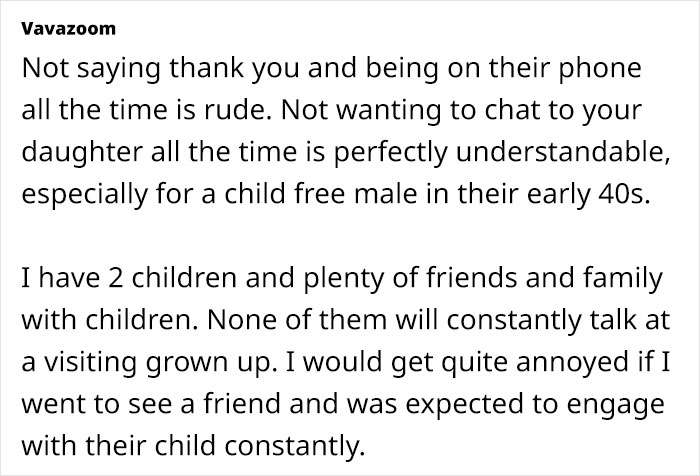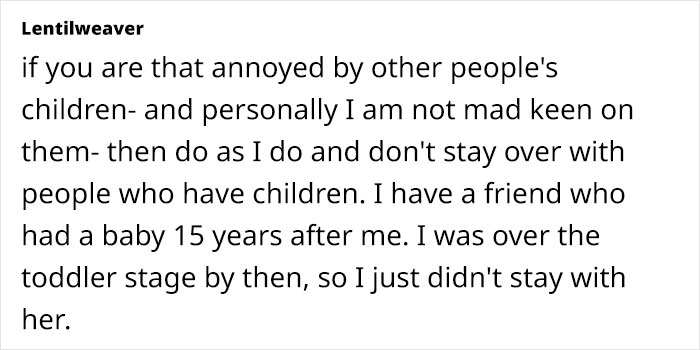Opening your home to a guest is a gracious thing to do and especially rewarding when they end up having a great time. It’s also a good opportunity to get to know them better and perhaps create some treasured memories together.
For one woman, though, she was taken aback when a friend of hers invited himself to her home for a weekend but spent most of the time stuck to his phone. Adding insult to injury, he didn’t say thanks for a single meal and complained about the couple’s talkative child when she wasn’t around.
More info: Mumsnet
Hosting a houseguest should be a pleasure, but for this woman it was anything but pleasant

Work friend invited himself to stay over for the weekend, spent most of the time on his phone



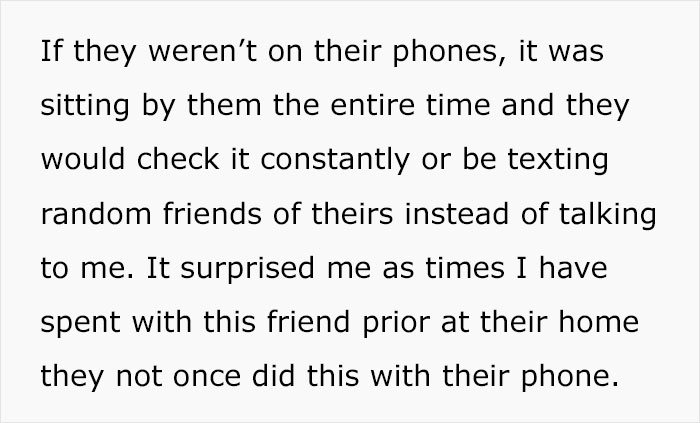
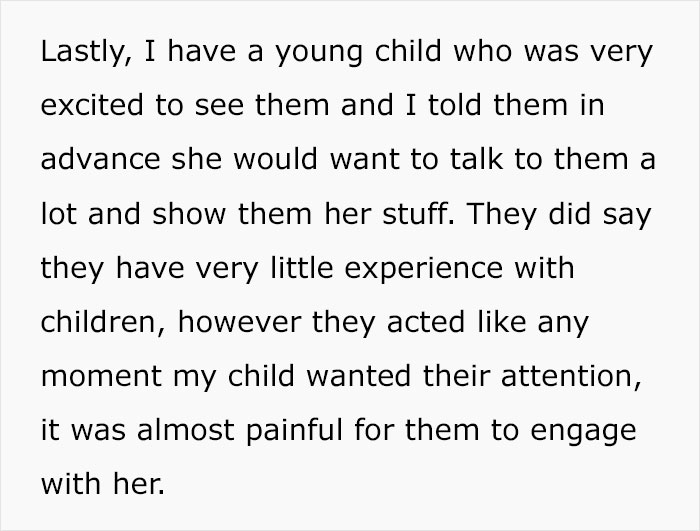

The woman’s talkative daughter was excited about the guest, but he basically snubbed her and complained about her behind her back
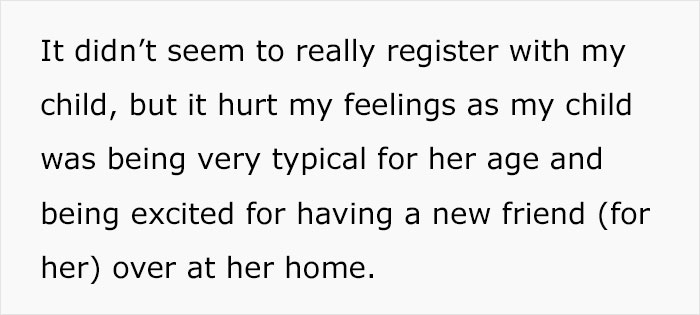



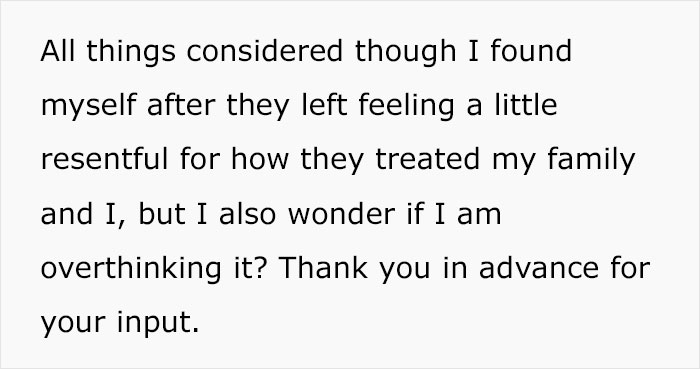

She and her husband prepared every meal, but didn’t once get so much as a thank you from their guest
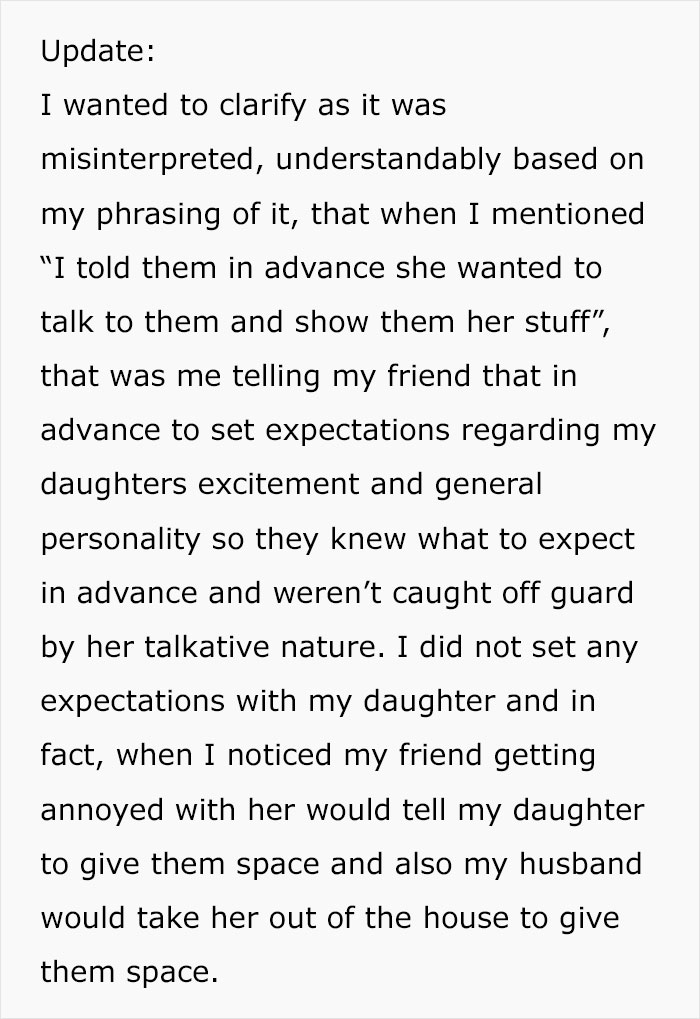
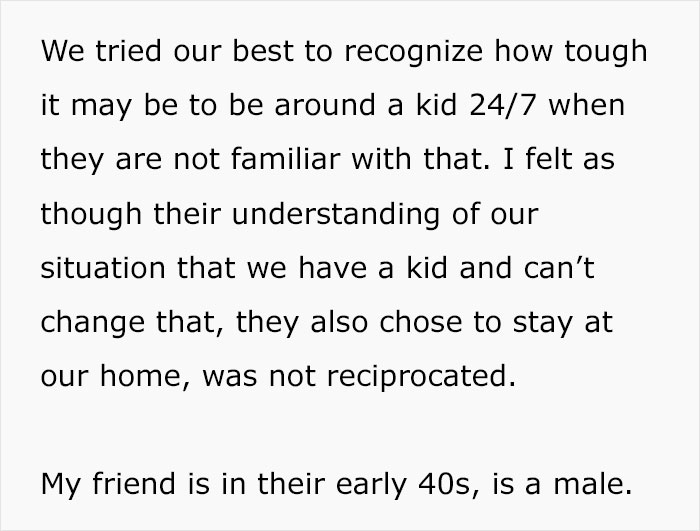
Image credits: KerryBay
The host ended up turning to the web to ask if she was being unreasonable in finding the guest quite rude
OP begins her story by telling the community that she recently hosted a work friend at her house for a 3-day weekend. She adds that, each day, she and her husband prepared all the meals (apart from going out for one lunch and dinner) but that the houseguest didn’t thank them even once for doing so.
To make matters worse, the friend spent every spare moment scrolling through their phone, playing mobile games, and texting friends, rather than engaging with OP. This was particularly surprising to OP since, when she’d previously stayed over at the friend’s house, he’d never been glued to his phone at all.
OP goes on to say that she has a young and talkative child who was very excited to have someone new around the house. She had forewarned her guest that her kid would be keen to talk to them a lot and show off her stuff, but when the kid tried interacting with the guest, he made it clear that the experience was annoying to him.
All the guest did to contribute the whole weekend was make his bed before leaving and pay for the appetizers (not even his meal and drinks) at dinner. After they left, OP found herself feeling rather resentful about the guest’s behavior and turned to the Mumsnet community to ask if she was being unreasonable in thinking the houseguest quite rude and wanting to end the relationship.
In an update to her original post, OP says she certainly won’t be opening her home to her ‘friend’ again and wouldn’t be staying at his place when she goes away on work trips, which had been their previous arrangement. OP also added that the guy’s behavior towards her daughter was strange, especially considering he’d previously mentioned really wanting a family.

Now that her so-called friend has shown his true colors, it seems inevitable that the friendship is heading for the rocks and there won’t be a ‘next time’ for the guest to mend his ways. But how should OP go about ending things without creating any hard feelings?
In her article for VeryWellMind, Arlin Cuncic writes that, before you decide how to break up with a friend, it’s helpful to understand the reasons why you no longer want to be friends with them.
Reasons you might identify for wanting to end a friendship include a change of circumstances, increased distance, mental health reasons, opposing values, and relationship toxicity.
According to Cuncic, there are four healthy options available to you when ending a friendship. In some instances, you may want to resort to a combination of these strategies.
First, you could consider the gradual fade-out, letting the friendship come to a natural end by gradually reducing the amount of social time spent with the other person. The second option is to talk it out, similar to the talk you’d have to end a romantic relationship, where you spell out the reasons for ending things.
Third is taking a break, which gives you the time and space you need to get a fresh perspective on the friendship, reevaluate things, and pick a way to move forward that suits you both best. Finally, you could choose to end things immediately, especially if the relationship has grown toxic and you need a way out to protect your mental health.
In her article for Today, Fadzai Mushayamunda writes that there are a lot of emotions that bubble up after the loss of a friendship — even if it was by choice.
She recommends taking the time to reflect on the role you played in the friendship ending, rather than playing the blame game, giving yourself the time to grieve the loss, and moving forward with the relationships you have with your true friends and family.
Bored Panda reached out to Dr. Deb Hecker to get her expert opinion on what went down.
When we asked her what she thought of the houseguest’s behavior, she had this to say, “At a first glance, it is easy to spot some of the guest’s unpolished (rude) etiquette. Texting while one is with others is as rude as getting up and leaving them in mid-sentence. Just don’t do it, I advise. Being served food and not saying thank you is the bottom of the barrel. Even three-year-old children have enough courtesy to say thank you. Going out for dinner and not offering to pay for drinks is a no-no.”
Hecker goes on to add that perhaps there was more going on than just rude behavior. She says, “People act differently in different situations. People can have different relationships with different people. As humans we are always evolving and changing our personalities to adapt to the environment. When around one person, some behaviors are reinforced, others dampened.”
She goes on to say, “Behavior can change because of life experience. I would speculate that there is unknown personal history that caused the houseguest’s behavior to morph from being a good considerate friend on a one-on-one basis to being a somewhat thoughtless person in the company of a family. Perhaps, he lacked confidence and a sense of feeling worthwhile when around a family. We are like jigsaw puzzles, always adapting and trying to fit in.”
We asked Dr. Hecker for one piece of advice she’d offer someone who needs to end a friendship, and she responded by saying that, before deciding to breakup with a friend, it’s important to understand the reason(s) you no longer want to be friends.
There can be any number of reasons why one wants to end a friendship: Your lives have changed, and you have gone in different directions; You have grown apart in terms of interests; A friend has become toxic, negative, deceitful, devaluing of you, or you no longer enjoy the friendship.
Hecker concludes, “If the friendship doesn’t naturally dissolve on its own and conversation is needed, you must always be respectful of the other person’s feelings, especially if the breakup is one-sided. You can be respectful while being honest and firm. Be clear about why you are ending the friendship and pay attention to how you deliver the news.”
What would you have done if you’d found yourself in OP’s shoes? Do you think she’s right to want to end the relationship? Let us know your opinion in the comments!
In the comments, people agreed the houseguest’s behavior was out of line, almost as if he treated the host’s house like an Airbnb


